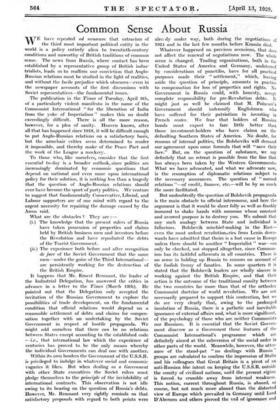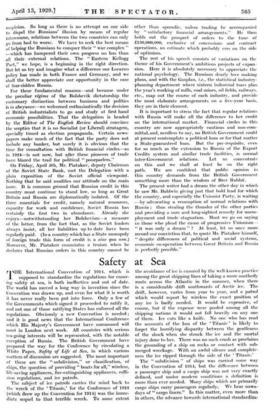Common Sense About Russia
WE have repeated ad nauseam that ostracism of the third most important political entity in the world is a policy entirely alien to twentieth-century conditions and unworthy of British traditions of common sense. The news from Russia, where contact has. been established by a representative group of British indus- trialists, leads- us to reaffirm our conviction that Anglo- Russian relations must be studied in the light of realities, and without the facile prejudice which obscures—even in the newspaper accounts of the first discussions with Soviet representatives—the fundamental issues. • The publication in the Times of Tuesday, April 9th, of a particularly violent manifesto in the -name of the Communist International " for the liberation of India from the yoke of Imperialism " makes this no doubt exceedingly difficult.. There is all the more reason, however, for a plea of sanity. Heaven knows, after all that has happened since 1918, it will be difficult enough to put Anglo-Russian relations on a satisfactory basis, but the armchair critics seem • determined to render it impossible, and thereby make of the Peace Pact and the work of the. League a mockery.
To those who, like ourselves, consider that the first essential to-day is a broader outlook, since politics are increasingly dominated by economic questions that depend on national and even more upon international policy for their solution, it is nothing less than a tragedy that the question of Anglo-Russian relations should ever have become the sport of party politics. We venture to suggest that fundamentally Conservative, Liberal, and Labour supporters are of one mind with regard to the urgent necessity for repairing the damage caused by the Arcos raid.
What are the obstacles ? They are :— (i.) The knowledge that the present rulers of Russia have taken possession of properties and claims held by British business men and investors before the Revolution and have repudiated the debts of the Tsarist Government.
(ii.) The experience both before and after recognition de jure of the Soviet Government that the same men—under the guise of the Third International— are persistently working for the destruction of the British Empire.
It happens that Mr. Ernest Remnant, the leader of the Industrial Delegation, has answered the critics in advance in a letter to the Times (March 18th). He pointed out that the Delegation only accepted the invitation of the Russian Government to explore the possibilities of trade development, on the fundamental condition that official relations would depend on a reasonable settlement of debts and claims for compen- sation together with an undertaking by the Soviet Government in respect of hostile propaganda. We might add ourselves that there can be no relations between States except according to the established code —i.e., that international law which the experience of centuries has proved to be the only means whereby the individual Governments can deal one with another.
Within its own borders the Government of the U.S.S.R. is privileged to indulge in whatever social and economic vagaries it likes. But when dealing as a Government with other State executives the Soviet rulers must pledge themselves to the principle of the inviolability of international contracts. This observation is not idle owing to its bearing on the question of Russia's debts. However, Mr. Remnant very rightly reminds us that satisfactory proposals with regard to both points were aLref dy under way, both during the negotiations of 1924 and in the last few months before Krassin died.
Whatever happened on previous occasions, that does not affect the renewal of negotiations now. The whole scene is changed. . Trading organizations, both in the United States of America and Germany, undeterred by considerations of punctilio, have for all practical purposes made their `"settlement," which, leaving aside the question of principle, amounts in practice to compensation for loss of properties and rights. Na Government in Russia could, with honesty, accept complete responsibility for pre-Revolution. debts. It might just as well be claimed that M. Poincare's Government should indemnify Englishmen who have suffered for their patriotism in investing in French renter. We fear that holders of Russian bonds must expect to fare little better than those investment-holders who have claims on the defaulting Southern States of America. No doubt, for reasons of internal politics, the Bolsheviks will demand our agreement upon some formula that will " save their face." But, on the question of substance, we say definitely that no retreat is possible from the line that has always been taken by the Western Governments. What we have advocated, and what we advocate now, is the resumption of diplomatic relations subject to the necessary assurances. The question of " normal relations "—of credit, finance, etc.—will be by so much the more facilitated.
But undoubtedly the question of Bolshevik propaganda is the main obstacle to official intercourse, and here the argument is that it would be sheer folly as well as frankly immoral to shake hands with someone whose constant and avowed purpose is to destroy you. We submit that any such analogy between State and individual is fallacious. Bolshevik mischief-making in the East— even the most ardent revolutionaries from Lenin down- wards have admitted that theirs is a lost cause in Europe unless there should be another " Imperialist " war--can only be checked, not stopped altogether, since Commun- ism has its faithful adherents in all countries. There is no sense in holding up Russia to ransom on account of the foolish frenzy of fanatics. In some - quarters it is stated that the Bolshevik leaders are wholly sincere in working against the British Empire, and that their action is the outcome of the traditional enmity between the two countries far more than that of the orthodox Communist doctrine of world revolution. We are not necessarily prepared to support this contention, but we do see very clearly that, owing to the prolonged insulation of Russia, there is a pathetic and inevitable ignorance of external affairs and, what is more significant, of the psychology of those who are, neither Communists nor Russians. It is essential that the Soviet Govern- ment disavow as a Government those features of the Communist International's programme which are definitely aimed at the subversion of the social order in other parts of the world. Meanwhile, however, the utter- ance of the stand-pat " no dealings with Russia " groups are calculated to confirm the impression of Stalin and his colleagues that Great Britain is a pivot of an anti-Russian bloc intent on keeping the U.S.S.R. outside the comity of civilized nations, until the present regime is forced to crumble away from internal weakness. This notion, current throughout Russia, is absurd, of course, but not much more absurd than the distorted view of Europe which prevailed in Germany until Lord D!Abernon and others pierced the veil of ignorance and suspicion. So long as there is no attempt on our side to dispel the Russians' illusion by means of regular intercourse, relations between the two countries can only go from bad to worse. We have to seek the best means of helping the Russians to conquer their " war complex " --which has hampered their own progress no less than . all their external relations. The " Eastern Kellogg Pact," we hope, is a beginning in the right direction. But let us try and imagine what a difference our Locarno policy has made in both France and Germany, and we shall the better appreciate our opportunity in the case of fear-ridden Russia.
For these fundamental reasons—and because under the peculiar regime of the Bolshevik dictatorship the customary distinction between business and politics is in abeyance—we welcomed enthusiastically the decision of British industrialists to go and study at first hand economic possibilities. That the delegation is headed by the Editor of The English Review should convince the sceptics that it is no Socialist (or Liberal) stratagem, specially timed as election propaganda. Certain news- papers make much of the fact that the party does not include any banker, but surely it is obvious that the time for consultation with British financial circles—as in 1924—is not now, but after these pioneers of trade have blazed the trail for political " pourparlers."
On Friday, April 5th, Mr. Piatakov, deputy Chairman of the Soviet 'State Bank, met the Delegation with a plain exposition of the Soviet official viewpoint. Nothing that he said modifies our attitude on the main issue. It is common ground that Russian credit in this country must continue to stand low, so long as Great Britain and Russia are diplomatically isolated. Of the three essentials for credit, namely natural resources, capacity for work and confidence, Soviet Russia has certainly the first two in abundance. Already she enjoys—notwithstanding her Bolshevism—a measure of the latter, from the fact that, as the Soviet leaders always insist, all her liabilities up to date have been regularly paid. (In a country which has a State monopoly of foreign trade this form of credit is a sine qua non.) Moreover, Mr. Piatakov enunciates a truism when he declares that Russian orders in this country cannot be other than sporadic, unless trading be accompanied by " satisfactory financial arrangements." then holds out the prospect of orders to the tune of £150,000,000, exclusive of concessions and contract. operations, an estimate which probably errs on the side of optimism.
The rest of his speech consists of variations on the theme of his Government's ambitious projects of expan- sion. Here it is absolutely necessary to appreciate the national psychology.. The Russians dearly love making plans, and with the Gosplan, i.e., the statistical industry- planning department where sixteen industrial tsars plan the year's working of mills, coal mines, oil fields, railways, etc., map out the course of each industry, and provide the most elaborate arrangements on a five-year basis, they are in their element.
It is important to stress the fact that regular relations with Russia will make all the difference to her credit on the international market. Financial circles in this country are now appropriately cautious and non-com- mittal, and, needless to say, no British Government could at present contemplate a political loan or for that matter a State-guaranteed loan. But the pre-requisite, even for so much as the extension to Russia of the Export. Credits system and similar trade facilities, is normal inter-Government relations. Let us concentrate on this and we shall at least be on the right path. We are confident that public opinion in this country demands from the British Government something more than the wisdom of Brer Rabbit.
The present writer had a dream the other day in which he saw Mr. Baldwin giving just that bold lead for which the country, and especially the Unionist Party, is waiting —by advocating a resumption of normal relations with Russia ; thus stealing the thunder of the other parties and providing a sure and long-sighted remedy for unem- ployment and trade stagnation. Must we go on saying to those who plead the cause of progressive Unionism- " it was only a dream " ? At least, let us once more record our conviction that, to quote Mr. Piatakov himself, " despite differences of political and social systems, economic co-operation between Great Britain and Russia is perfectly possible."



















































 Previous page
Previous page